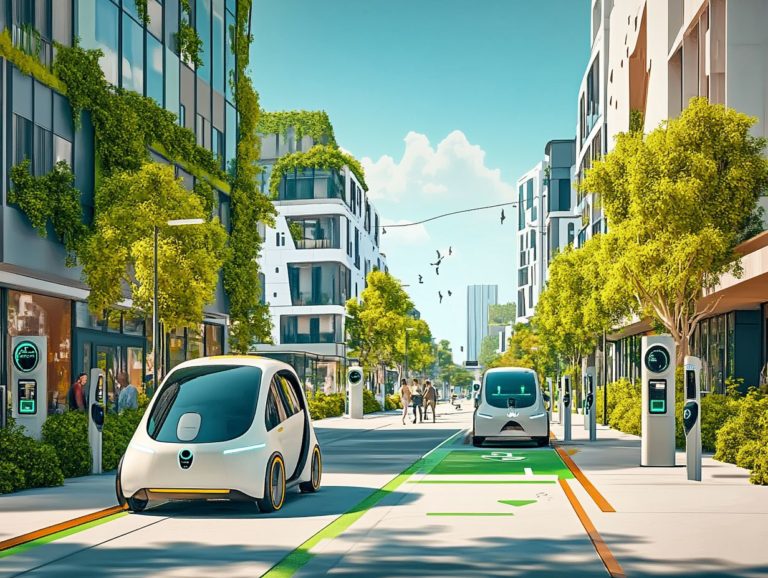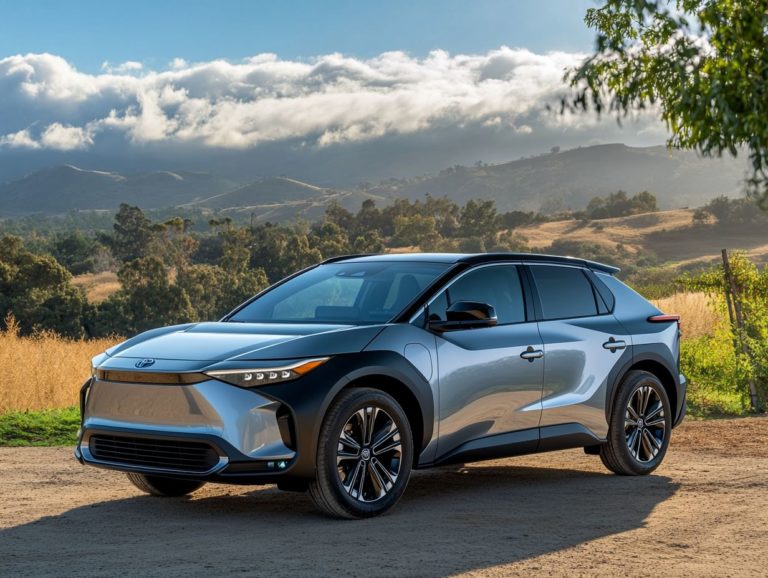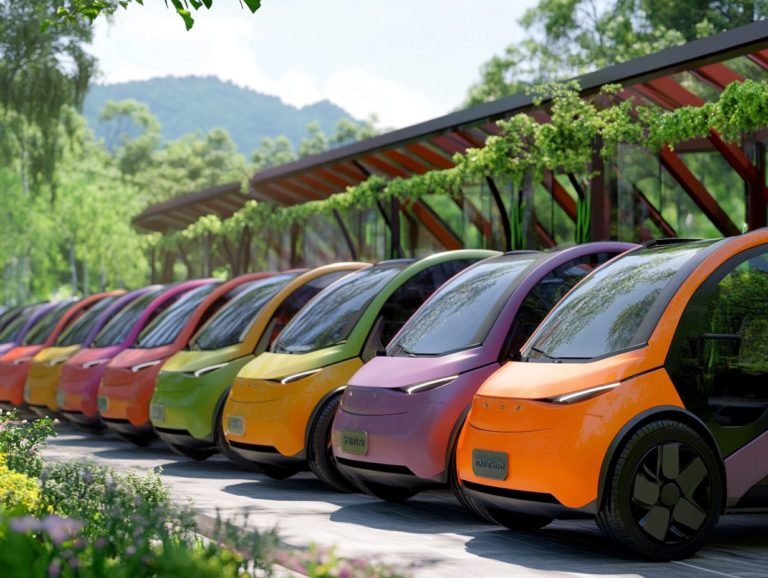Electric Vehicle Technology: What’s New in 2024?
Electric vehicles (EVs) represent a groundbreaking shift in the automotive industry, seamlessly merging technology with sustainability. Get ready to explore the exciting history of EV technology!
This article delves into the swift evolution of EV technology, showcasing advancements such as innovative battery solutions, extended range, and accelerated charging capabilities. You ll also explore the implications of these changes for manufacturers, the drive toward a greener future, and predictions for the electric vehicle landscape in 2024 and beyond.
Prepare to uncover the developments that are poised to shape the future of transportation.
Contents
- Key Takeaways:
- Overview of Electric Vehicle Technology
- Advancements in Electric Vehicle Technology
- Impact of Electric Vehicles on the Automotive Industry
- Future of Electric Vehicles
- Frequently Asked Questions
- What is Electric Vehicle Technology and How is it Changing in 2024?
- How are the Batteries in Electric Vehicles Evolving in 2024?
- What Improvements Can We Expect in Charging Infrastructure for Electric Vehicles in 2024?
- Will Electric Vehicles Become More Affordable in 2024?
- What Role Will Autonomous Driving Technology Play in Electric Vehicles in 2024?
- How Will Electric Vehicles Contribute to a Greener Future in 2024?
Key Takeaways:
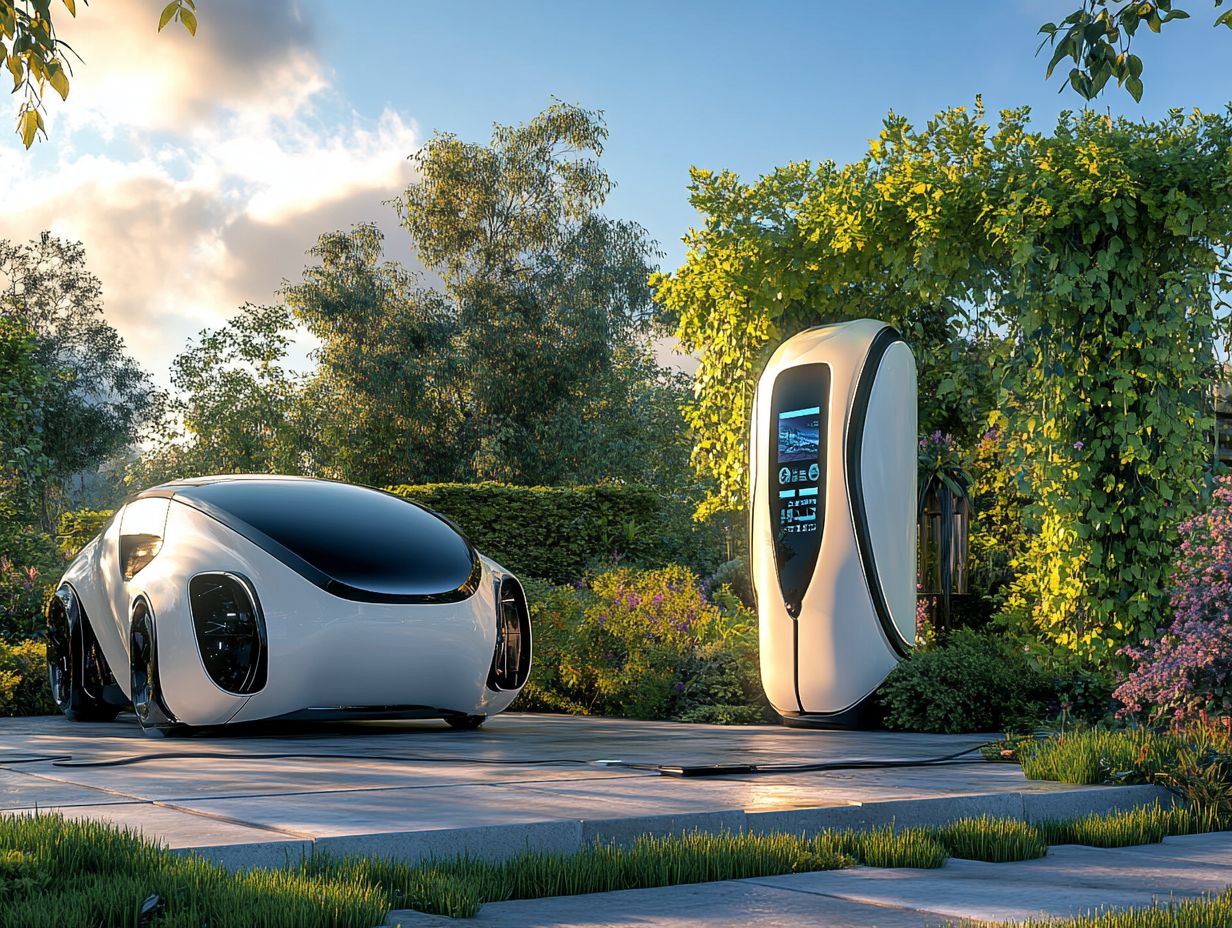
- New battery technologies are revolutionizing the electric vehicle industry, promising improved range and charging times for a more convenient driving experience.
- The growth of electric vehicles drives a shift toward more sustainable transportation, presenting both challenges and opportunities for manufacturers in the automotive industry.
- Predictions for 2024 and beyond show that electric vehicles will continue to evolve and play a significant role in shaping the future of transportation, with advancements in technology and increasing demand from consumers.
Overview of Electric Vehicle Technology
Electric vehicle (EV) technology has truly transformed the automotive landscape, introducing groundbreaking advancements that redefine vehicle operation, minimize emissions, and elevate performance.
With the rise of brands like Tesla, featuring the iconic Model 3 and the eagerly anticipated Cybertruck, alongside formidable competitors like Hyundai and Kia, you re witnessing the emergence of a dynamic environment.
This space embraces autonomous driving capabilities and extended range, creating a new standard in transportation. This evolution is far more than a passing trend; it represents a profound shift in how you view mobility and sustainability.
History and Evolution
The history and evolution of electric vehicles traces back to the 19th century, with key milestones leading to the impressive electric cars of today. You ll notice how Tesla’s innovative approaches, along with the rise of brands like Hyundai and Kia, have transformed the landscape.
This transition from gasoline to electric power has opened doors for newcomers such as Rivian with its R1T and Lucid Air, while established names like Volkswagen also vie for a piece of the expanding EV market.
Over the years, technological advancements have shifted how you perceive electric mobility, driving a gradual move towards greener alternatives. The journey from lead-acid batteries to modern lithium-ion technology highlights the development in battery efficiency, crucial for extending vehicle range and enhancing performance.
The introduction of landmark models like the Tesla Model S catapulted electric vehicles into the mainstream. This fostered a cultural acceptance that once seemed unimaginable. Concurrently, automakers like Hyundai have rolled out their Ioniq line, showcasing the increasing diversity of EV options available today.
This marks a collective effort to reduce carbon footprints and champion sustainability, inviting you to be part of the change.
Advancements in Electric Vehicle Technology
Advancements in electric vehicle technology encompass a wealth of innovations tailored to elevate the efficiency, performance, and sustainability of EVs. You’ll find Tesla at the forefront, pioneering with its groundbreaking Cybertruck and cutting-edge battery technologies, alongside the feature highlights of 2024 electric SUVs.
This evolution is defined by remarkable enhancements in charging technology and the adoption of 800-volt architecture, which dramatically reduces charging times and broadens the possibilities for electric vehicles.
Join the electric vehicle revolution today!
New Battery Technologies
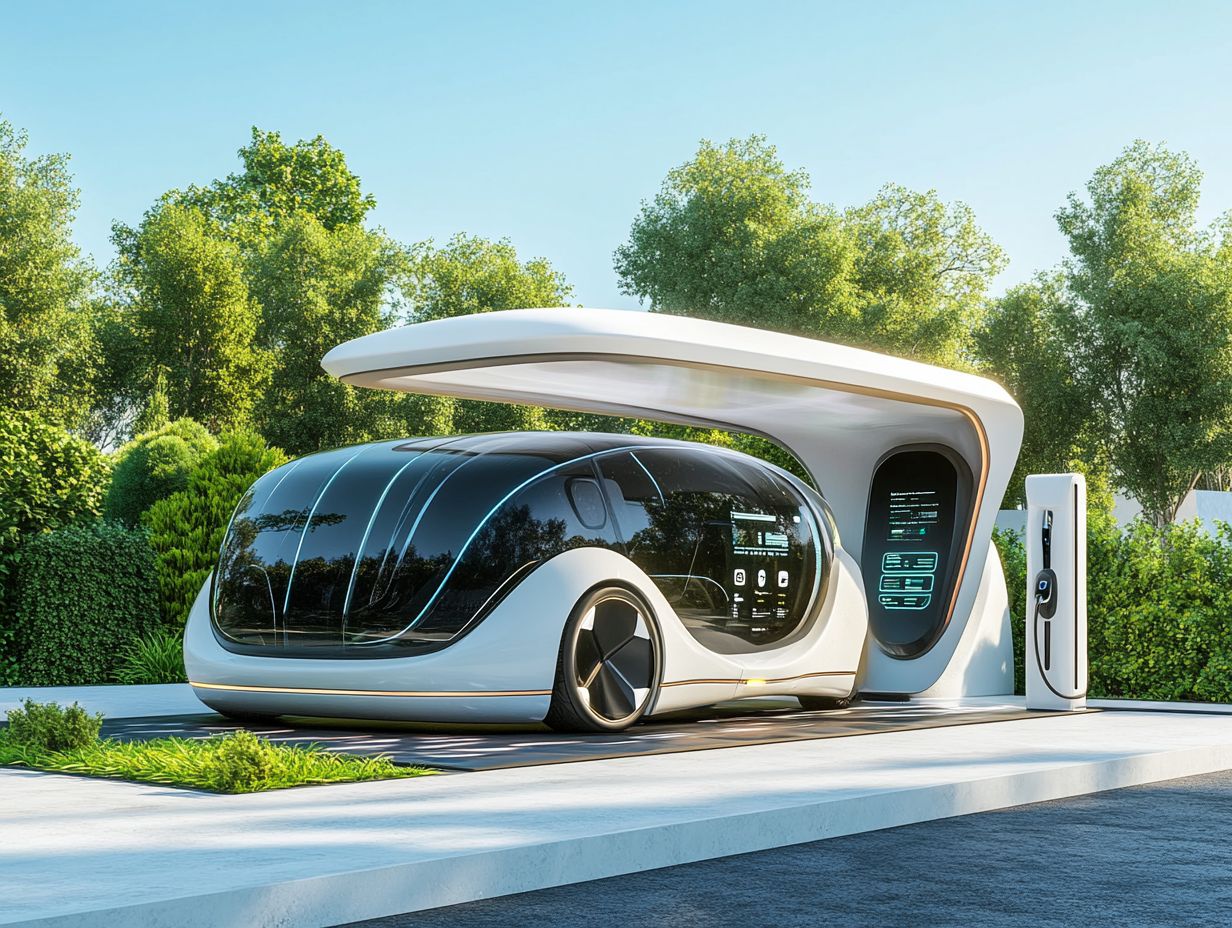
New battery technologies are leading the charge in electric vehicle innovation, enhancing capacity, efficiency, and charging speed. Tesla is playing a pivotal role in this evolution, alongside impressive contenders like the Ioniq 5.
The game-changing 800-volt architecture is revolutionizing battery operations, enabling faster charging and enhanced overall performance.
As the industry seeks greener alternatives, various new formulations are stepping into the spotlight as viable options. Solid-state batteries, which are newer and safer compared to traditional options, aim to address the limitations of lithium-ion cells, particularly in energy density and safety.
Not only is Tesla at the forefront of these developments, but competitors like the Ioniq 5 are also keenly exploring innovative lithium-ion alternatives. The potential for improved energy storage and reduced charging times is promising; it s poised to significantly influence consumer adoption and reshape the electric vehicle landscape.
With ongoing research and development, the excitement surrounding these battery technologies points to a transformative shift in how we envision sustainable transportation.
Improved Range and Charging Times
Improved range and charging times are essential for elevating your experience with electric vehicles. Brands like Tesla, Lucid Air, and Rivian R1T are at the forefront of innovation in this space.
Recent advancements in charging technology have dramatically cut down wait times and extended the distance you can travel on a single charge, effectively addressing common consumer concerns and encouraging wider adoption.
Take Tesla s Supercharger network, for instance. It allows you to significantly boost your range in just a few minutes, making long road trips a reality. Lucid Air s cutting-edge battery technology prioritizes greater energy density, enabling you to cover longer distances without the hassle of frequent stops.
Meanwhile, Rivian R1T combines off-road capabilities with impressive range metrics, perfectly catering to your adventurous spirit.
The importance of range is hard to overstate; it directly impacts your purchasing decisions as you look for vehicles that reliably fit your daily needs and lifestyle. As these technologies continue to evolve, your perceptions of electric mobility are likely to shift, making it a viable and appealing option for a diverse audience.
Enhanced Safety Features
Enhanced safety features in electric vehicles are increasingly integrating self-driving features that help control the car, with major players like Tesla, Hyundai, and Kia leading the charge.
These advancements not only bolster the overall reliability of electric vehicles but also reflect the industry s dedication to fostering a safer driving environment.
For example, Tesla’s Autopilot system employs advanced sensors and cameras to elevate situational awareness, allowing the vehicle to make real-time adjustments to sidestep potential accidents.
Similarly, Hyundai’s SmartSense technology introduces features like forward collision-avoidance assistance, which actively engages the brakes to avert crashes. Kia’s Drive Wise system further enhances road safety with lane-keeping assist and blind-spot monitoring, contributing to a comprehensive approach to safety.
As these features gain traction, they instill greater consumer confidence, motivating even the most cautious buyers to consider adoption. This momentum also encourages regulatory bodies to rethink and update safety standards to keep pace with rapidly evolving technologies.
Impact of Electric Vehicles on the Automotive Industry
The influence of electric vehicles on the automotive industry is significant, transforming market dynamics and fostering a shift toward sustainable transportation worldwide.
As you consider the challenges manufacturers face in production and consumer acceptance, it’s essential to recognize the myriad opportunities that arise for innovation and the chance to capture new segments within the ever-evolving landscape of electric mobility.
To learn more about electric vehicles and explore options available to you, take the next step towards understanding this exciting evolution in transportation!
Shift Towards Sustainable Transportation
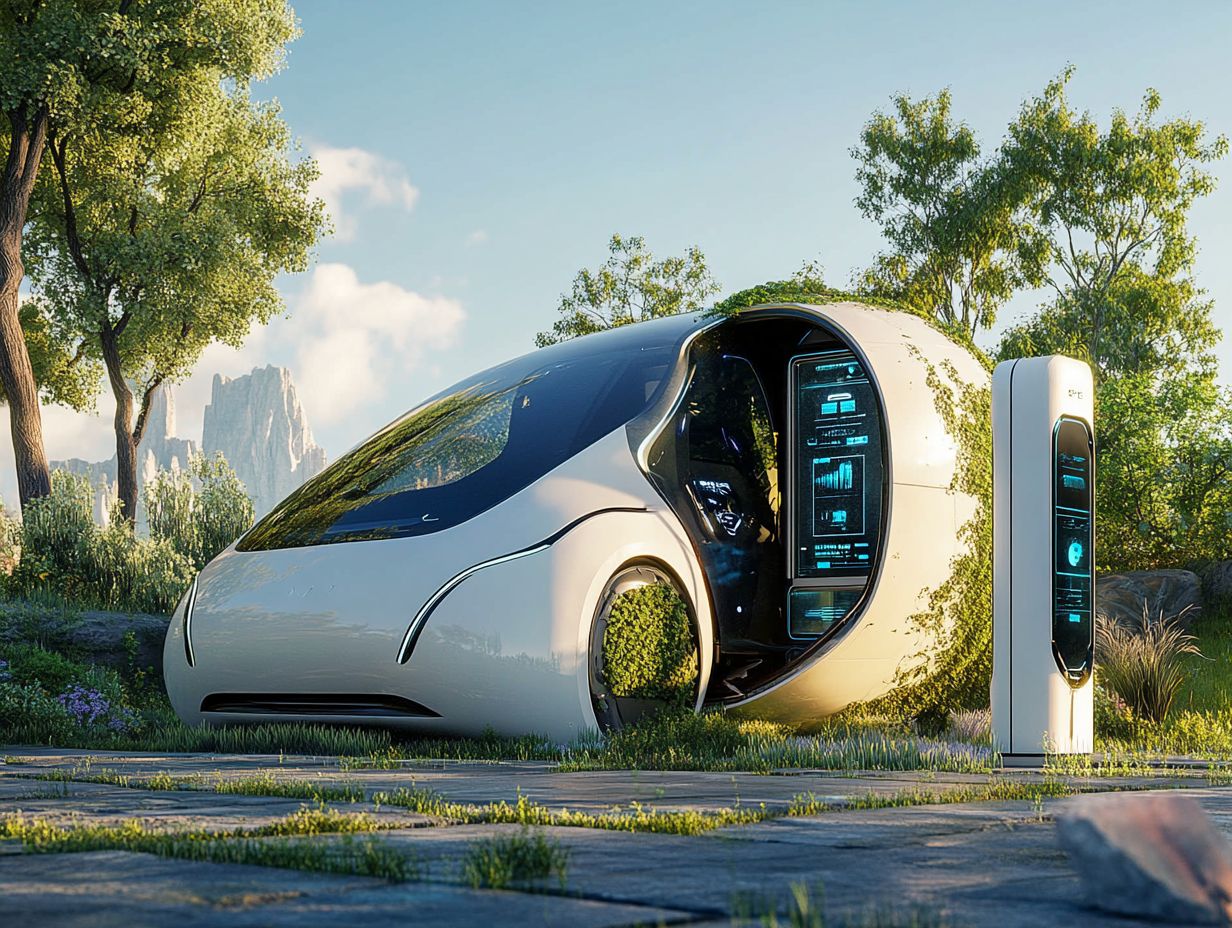
The shift toward sustainable transportation is brilliantly illustrated by the meteoric rise of electric vehicles. Brands like Tesla are leading the charge. A wave of innovative Chinese manufacturers is entering the fray. This transformation is essential for reducing emissions and nurturing an eco-friendly future for the automotive sector.
More consumers are opting for eco-conscious choices. The widespread adoption of electric vehicles signals a hopeful decline in carbon footprints. By moving away from fossil fuels, these vehicles boost energy efficiency and inspire advancements in battery technology and renewable energy integration.
The contributions of established names like Tesla, combined with fresh perspectives from emerging competitors in China, represent a collaborative effort to revolutionize transportation and set new industry standards.
This electrification movement benefits the environment and encourages policymakers to champion sustainable infrastructure, ultimately reshaping global energy consumption patterns.
Challenges and Opportunities for Manufacturers
Manufacturers in the electric vehicle market encounter a myriad of challenges, from technical challenges to fierce market competition. They also discover significant opportunities for growth and performance enhancements.
Mastering the art of navigating these complexities is vital for achieving success in this rapidly evolving industry. Supply chain issues, especially in securing essential components like batteries and semiconductors, present considerable obstacles.
These challenges can disrupt production timelines and compromise efficiency. You must also consider consumer acceptance. Public perception can dramatically shape market demand and influence your investment strategies.
Regulatory compliance is another critical element to keep in mind. Ever-evolving policies and standards impact your operational frameworks.
Amidst these challenges lie golden opportunities for innovation. Advances in battery technology and smart features that enhance user experience can pave the way for market expansion and differentiation.
Future of Electric Vehicles
The future of electric vehicles is set for extraordinary advancements, with predictions suggesting a transformative era for the industry by 2024 and beyond.
As manufacturers innovate and focus on performance enhancements, you can expect the landscape of electric mobility to evolve at an unprecedented pace.
Predictions and Projections for 2024 and Beyond
Predictions for 2024 and beyond indicate a significant rise in the adoption of electric vehicles. This surge will be propelled by innovations from industry leaders like Tesla, including the top 10 electric vehicle innovations of 2024 and advancements in self-driving technology.
These developments promise to redefine user experiences and establish new benchmarks for performance and sustainability. As the demand for eco-friendly transportation escalates, various market projections suggest that electric vehicles will capture a substantial share of the automotive landscape.
Major players in this sector are enhancing battery efficiency and striving to reduce costs. This will make electric options more accessible to you and a broader audience.
Trends show that your preferences are shifting towards sustainable modes of transport. There is a growing expectation for new models that boast longer ranges and faster charging capabilities.
This combination of technological advancements and evolving consumer behavior is poised to solidify the electric vehicle’s role in future mobility, paving the way for a cleaner, smarter world.
Frequently Asked Questions
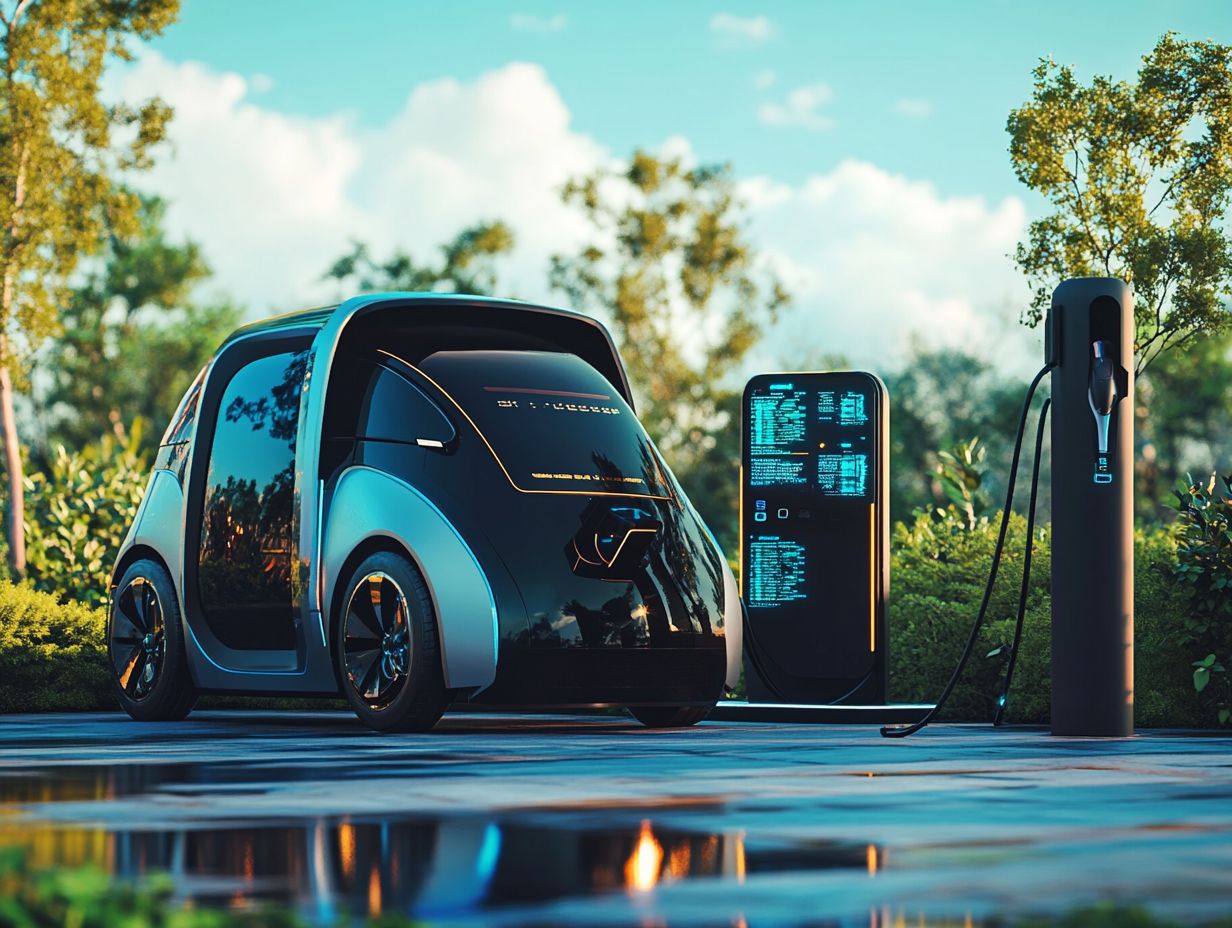
Stay tuned for more updates on how electric vehicles are changing our world!
What is Electric Vehicle Technology and How is it Changing in 2024?
Electric Vehicle Technology includes advancements in creating and using electric vehicles. Get ready for major leaps in battery tech, charging networks, and the most anticipated electric vehicles of 2024!
How are the Batteries in Electric Vehicles Evolving in 2024?
In 2024, battery technology will see remarkable improvements. Expect longer ranges, faster charging times, and enhanced safety, thanks to solid-state batteries. For those considering a new vehicle, check out the best electric cars for commuters in 2024, as these batteries use solid materials, making them safer and more efficient!
What Improvements Can We Expect in Charging Infrastructure for Electric Vehicles in 2024?
There will be a significant push to enhance charging infrastructure. Look for fast-charging stations that can power up your vehicle in minutes, along with more charging points in public spaces and workplaces.
Will Electric Vehicles Become More Affordable in 2024?
Yes! The cost of electric vehicles is likely to drop in 2024. With advancements in battery technology and increased production efficiency, electric cars will compete better with traditional gasoline vehicles.
What Role Will Autonomous Driving Technology Play in Electric Vehicles in 2024?
In 2024, autonomous driving technology will make huge strides. This innovation will not only enhance convenience but also boost safety and cut down on road accidents.
How Will Electric Vehicles Contribute to a Greener Future in 2024?
Electric vehicles will be key players in building a greener future! As sustainability efforts grow, their rise will help lower our carbon emissions, especially as more nations switch to renewable energy.

